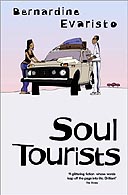
Soul Tourists
by Bernardine Evaristo
304pp, Hamish Hamilton, £10.99
It’s the summer of 1989. On a Turkish coastal bus headed for Istanbul, Stanley Williams, banker son of Jamaican immigrants, takes the only seat left. Next to him, a bulky woman wears a straw hat. She turns out to be the ghost of Mary Jane Seacole, aka the black Florence Nightingale. It’s a giddy moment, as we’re ricocheted from the closing scenes of a late 20th century road movie to the juicy anachronisms of a stout spectre checking into Constantinople. “I think you were way ahead of your time, Mrs Mother Aunty Yellow Doctress,” quips Stanley. “I do believe you are correct, you impudent rapscallion!” comes her reply. This particular ghost is also bent on puncturing flippancy. “Life is a very serious matter. Especially when it no longer fills you up from the inside, but has abandoned you to watch it as an observer who can sympathize but no longer empathize.”
Seacole speaks for the bevy of under-exposed black figures from “white” western history assembled by Bernardine Evaristo to taunt and haunt Stanley, detecting in him a certain susceptibility. Think the putative Dark Lady of Shakespeare’s sonnets, Lucy Negro of Clerkenwell; or Hannibal; or Ziryab the Iraqi civiliser who revolutionised the design of the lute and introduced toothpaste to the court of Cordoba; or the first black colonel in the French Army, Joseph Boulogne; or Queen Charlotte, wife of George III; not to mention the progeny of the cuckolded Louis XIV. In this young man, bludgeoned by what he dubs his parents’ immigrant mentality (“I couldn’t, so you must”), who leaves behind his immaculately white London flat to travel abroad for the first time, they spot a sentient soul ripe to be laid wide open. As Stanley himself reflected in Gibraltar earlier on in his travels, after the first of many split-ups with his travelling companion, Jessie, and while debating whether to catch the ferry to Tangier: “ ... if Europe was opening little skylights, through which he could see that its history was more than he’d ever realised, then surely Africa would open whacking great doors, through which he might never return.”
Stanley is the backseat driver in a bumpy love-story that begins at Mingles on Piccadilly Circus and takes to the roads a few months later in a clapped-out banger called Matilda. He’s hooked on Jessie O’Donnell, latterday Wife of Bath and former cabaret singer - “a black woman with the novelty of a Northern accent infused with what she imagined was a Texan drawl”. A foundling, dumped outside Leeds Infirmary and raised by the Sisters of Mercy, Jessie wants to drive to Australia to be reunited with her son.
The Seacole encounter or, wittier still, Stanley’s brush with the Pops of modern Russian literature - “ ‘Ah was searchin’ for ma roots, Daddy-O!’ Pushkin exclaimed in cod American, as he launched into a clumsy attempt to do the Funky Chicken, flapping his arms and trying out some super-slippery footwork” -breezily confirms the craft of Evaristo’s hip-hop signature. Here are moments delirious as those elephants sketching ‘Yo!’ in the circus dust before the Emperor Septimus Severus, in her Londinium novel The Emperor’s Babe, where young peeps in baggy tunics banter gutter Latin in the ghetto fabulous. Evaristo revels in meshing timeframes, juggling spoken and narrative registers, fusing the glaringly incompatible, and, here, flipping between free-style verse, prose and dramatic dialogue.
The secret to her alchemical touch lies in transforming this experimentation into funky yarns so tantalising you want to devour them. Yet so ambitious is the premise and scope of Soul Tourists, that Seacole’s line about disconnection ultimately touches on the lot of the alienated reader-cum-tourist. Although Evaristo possesses enough ball-busting originality to create whole novels for each of the historical characters she resurrects, here, all too frequently she makes them sound like ventriloquists’ props in a masque, on a loop, mouthing skinny biographical bullet-points. Why, even the wind gives PC history lessons, blowing the narrative of Jabal al-Tariq, Gibraltar’s namesake, into Stanley’s ear. As our co-pilots lurch their way through Europe - and to their own truces with history, personal and otherwise - countries and peoples are offered up as the glossed set pieces Evaristo thrills in exploding.
Soul Tourists is long on the museum tour but short on soul. Those sketchy, tenebrous ghosts could do with some beefing up. As could the tussle for narrative direction between Stanley and Jessie, whose driftings fail to convert into dramatic interaction. Above all, it’s a trip that leaves you hankering after the more exuberant terrain of Evaristo’s previous verse novels, where readers don’t just gawp but empathise too.

